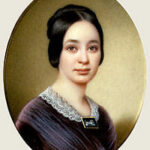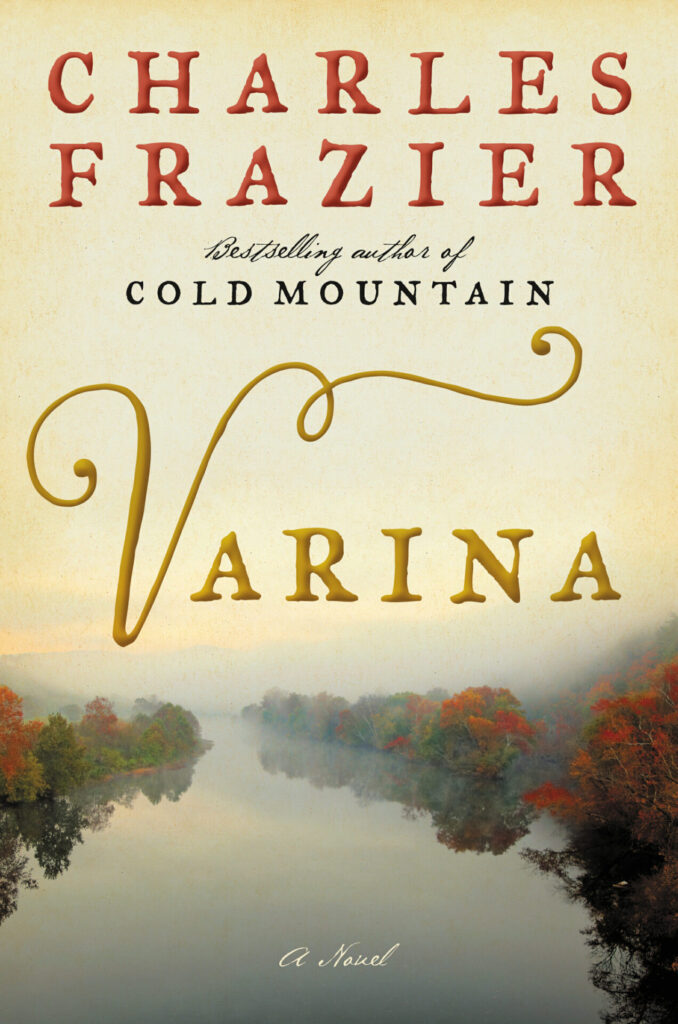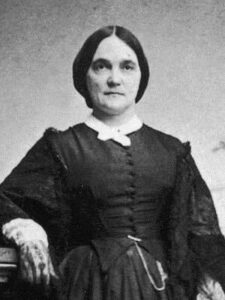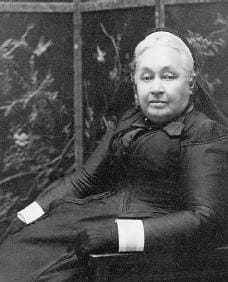Arts & Entertainment
Review: "Varina" a "Broader, Grander Book" Than "Cold Mountain"

This black-and-white daguerreotype of Jefferson Davis and Varina Howell Davis was taken in 1845, when they were married.
“Varina.” By Charles Frazier. Ecco Press. $27.99.

The color painting of Varina Davis is a miniature painted by John Wood Dodge in 1849, when she was twenty-three. The miniature is in the collection of the National Portrait Gallery.
Editor’s Note: Charles Frazier will read and sign copies of “Varina” at 5 p.m., Wednesday, April 25, at Off Square Books.
“Varina,” Charles Frazier’s trim masterpiece of a Civil War novel, is a broader, grander book than “Cold Mountain,” the epic Civil War novel that earned Frazier a National Book Award. “Cold Mountain” was the story of a disillusioned soldier walking home to his sweetheart. “Varina” is the story of Varina Howell Davis: Natchez belle, plantation mistress, society hostess, New York World columnist, and First Lady of the Confederacy.
Frazier calls his character V. His heroine sometimes signed her name V Jefferson Davis, as if she were only the wife of a historical figure. When they marry, V is eighteen and Jeff is thirty-six. “She found him very handsome, in a lean, bony way,” Frazier comments. “She thought she had married an idiosyncratic widower with a raw plantation … She expected they would spend their lives growing cotton and food crops and children.”
V learns that Jeff would rather be a hero or a martyr than a husband.
 “Most mornings, on his way out the door, V reminded him that every moment didn’t need to be lived on a battlefield. Mostly during V’s famous dinners Jeff was not at all funny. He sat absorbing the wit of others for long stretches of conversation and then he issued some piercing comment, dry and oblique.”
“Most mornings, on his way out the door, V reminded him that every moment didn’t need to be lived on a battlefield. Mostly during V’s famous dinners Jeff was not at all funny. He sat absorbing the wit of others for long stretches of conversation and then he issued some piercing comment, dry and oblique.”Routinely, V and Jeff live apart, for months or years.
Mary Chesnut, who records each day the heady rise and slow collapse of the Confederacy, is V’s close friend. Mary dabbles with opiates. V herself is no stranger to the potions prescribed for women’s ailments. As they flee from Richmond, Mary and V stir morphine into red wine and talk past midnight. V thinks about Mary’s narrow hips and her friend’s childlessness and confesses her own flirtation with her husband’s handsome young aide. Twisting the language of “The Tempest,” Frazier lets the diarist speak about the stories that fiction can reconstruct:

Mary Boykin Chesnut (1823-1885), a South Carolina writer whose “Diary” supplies one of the great records of the Civil War, was a close friend of Varina Davis.
“Mary drank and thought and then raised her glass and professed, History reveals a person’s deeds – their outward character but not themselves. There is a secret self that has its own life rounded by a dream – unpenetrated, unguessed.
“V clapped two slow claps and said, Beyond the Shakespeare, is any of that yours?
“The first part, a little.”
Ironically, the life that Frazier reconstructs for V is never dream-like. It is the Southern past seen from eye level, warts and all. In “Varina,” it is history that has the qualities of dream: the Mexican War, the dinner parties of the antebellum Senate, Jeff’s presidential ambitions.
The nightmares come, further south, in a countryside devastated by Yankee raiders. V buys scabs from a sick boy to inoculate her children against smallpox. An evening brings visitors to the campfire—disfigured deserters, “bummers” who loot and rob. In a Georgia pine forest, V must deal with a family who have palisaded their farmhouse and sheltered inside with their hounds, their hogs, a well-read library, and an arsenal of revolvers and repeating rifles. “Every one of us killed at least a person, and two of the girls can’t lift the blame off themselves,” the worn-down lady of the house reports.
These hellish landscapes outdo Cormac McCarthy. They are as grotesque and violent as McCarthy, and Frazier achieves these effects without resorting to McCarthy’s overheated post-Faulknerian rhetoric.
A handful of Confederate naval cadets escort the fleeing Confederate government. Frazier follows two of them, Ryland and Bristol. They have blown up their training ship and put down a riot and now they are scrambling south. They may be Huck and Tom’s hard-bitten cousins; they may be schoolboy versions of Gus McCrae and Woodrow Call. Tragically, they also figure in the book’s deadliest encounter—with a third Southern teenager, a sullen, arrogant white youth who has already brooded too long about the war.

Varina Davis as grande dame — Varina Davis lived until 1906, supporting herself as a newspaper columnist; living near Times Square and summering in the Adirondacks with her friend Julia Grant, Ulysses Grant’s widow; and completing her husband’s autobiography.
Just beneath the narrative lie themes of race and respect. The book is set in motion by a black schoolteacher, James Blake. He seeks out V in 1906. Four decades have passed, but she remembers him: little Jimmie Limber, whom she rescued from a slum in Richmond. Towards V, James feels gratitude and some loyalty—and yet, certain questions he asks her will be wounding. “I always wondered whether my name is real or if I made it up.” “Was I born enslaved?” “Did you ever own me?”
If there is a symbolic vignette in this book, it comes when Ryland and Bristol meet two rail-riding black fugitives. They swap with them, at dinnertime, a battered pistol for cornpone and pork belly. One fugitive asks:
“You boys expect this is truly the end? … End of the war for you. For us, the Federals coming and setting us free.
“True fact, Bristol said. Sunrise tomorrow, new world coming for everyone. Day one.”
The themes of Southern history may be eternal. In the years that this book covers, as in the years in which it was written and published, Confederate heroes have been mocked, their lost cause has been questioned, bitter white boys have taken black lives, and (as ever) a New South may be emerging. Southerners are once more challenged to stand like Jeff Davis or break free like Bristol. V can see this choice; she can almost make that leap.
With a clear, cold, historical eye, Willie Morris wrote that “Cold Mountain” was “contemporary in the profoundest sense.” “Varina” speaks just as directly to the present.

Charles Frazier (photo by Mark Humphrey)
Allen Boyer is HottyToddy.com’s book editor and the author of “Rocky Boyer’s War: An Unvarnished History of the Air Blitz That Won the War in the Southwest Pacific.”





























